Croatia
-
Buljević, Sonja
 Sonja Buljević (1949 – 2021)
Sonja Buljević (1949 – 2021)Biography
Sonja Buljević was a graduated librarian and a teacher of Croatian. She worked in the Grammar Schools in the towns of Rijeka and Buje (Istria). Her poetry in the Chakavian dialect was published in a number of joint collections, magazines and post-contest anthologies. She wrote haiku as well and transferred her love and knowledge of this kind of poetry to her pupils, who received a number of awards at haiku competitions. As a retired person she volunteered at the workshops of creative writing. For her success in her pedagogical lifetime’s work she was bestowed a medal of the town of Buje in 2015.
Books published - Japanese short poems
Čipkasta svjetlost / Lacy Light, haiku, Matrix Croatica, Buje, posthumously
Selected haiku:
In the wine cellar
a bottle and a hoe
forgotten.U podrumu
boca i motika
zaboravljeni.Va konobe
bocun i matika
zabjeni.(Honorable Mention, Kloštar Ivanić Haiku Competition, Croatia 2008 – in the Chakavian dialect)
*
Sea twilight
fishing boats set sail
side by side.Sumrak na moru.
Isplovile ribarice
bok uz bok.(Ludbreg Joint Haiku Collection, Croatia 2011)
*
Sat by the sea.
Blueness above and below me
blue everywhere.Sjedim pored mora.
Plavo gore i dolje
plavet posvuda.Sedin pul mora.
Modro gore i dole
modro sakuda.(IRIS No. 12, Croatia 2016 – in the Chakacian dialect)
*
Spring rain
tenderly soaking
my already wet clothes.Proljetna kiša
nježno natapa moju
već promočenu odjeću.(Honorable Mention, The 19th Apokalipsa Haiku Contest, Slovenia 2017)
*
The first snow
fluttering – a little girl
spreads her arms.Leprša prvi snijeg
djevojčica
raširila ruke.https://akitahaiku.com/2020/08/03/world-haiku-series-2019-171-haiku-by-sonja-buljevic/
-
Đuretić, Nikola
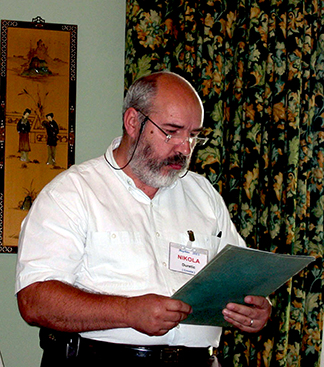 Nikola Đuretić
Nikola ĐuretićNikola Đuretić was born in Osijek Croatia in 1949. He worked in publishing and for more than twenty years in London as a Senior Producer with the BBC. Thus far he published more than thirty books of prose, poetry, essays and feuilleton, of which twelve are collections of haiku. For his literary work he received numerous awards of which several for haiku Honourable mention at 16th and 24th HIA Haiku Contest, Runner up at International Haiku Contest “Vladimir Devide”, Honourable Mention at 2nd Morioka International Haiku Contest, Merit Award ITO EN Oi Ocha twice, International Sakura Award, etc.. For his contribution to Croatian culture he was awarded the highest state order for culture in 1998. A member of the Croatian Writers’ Association, he lives in Zagreb Croatia.
-
Gatalica, Goran

Goran Gatalica
Goran Gatalica was born in Virovitica, Croatia, in 1982 and currently resides in Zagreb, Croatia.
He finished both physics and chemistry degrees from the University of Zagreb and proceeded directly to a PhD program after graduation. He has published poetry, haiku, and prose in the literary journals and anthologies.
-
Klarić, Ivanka Glogović
 Ivanka Glogović Klarić (1939 ̶ 2022)
Ivanka Glogović Klarić (1939 ̶ 2022)Biography
Ivanka Glogović Klarić was a retired professor of Croatian and English. She published poems, stories and drama in the Chakavian dialect, from the time of her High School days, mostly for children. Her work was published in newspapers, magazines, on the radio and TV. She produced 12 books. In co-authorship with the composer Natalija Banov she published two books of poems put to music (with notes and CD). Ivanka Glogović Klarić also published two books with short texts about the Chakavian lexicography. Sixty of her poems were put to music, as well. She has been writing haiku for a long time. She was bestowed an award by the town of Opatija for her life’s work and achievements.
Books published - Japanese short poems:
- Kapljice mora / Sea Droplets (Rijeka, 2002)
- Likovno poetska mapa / Artistically poetic map (2012)
Selected haiku:
A lonely child
and a crab on the beach
both scared to death.Na žalu račić
i usamljeno dijete
nasmrt preplašeni.(Second Prize, Haiku Calendar/Rokovnik Ludbreg, Croatia 2004)
*
A cold April morning –
violets and primroses
warmed up the market.Hladno travanjsko jutro –
ljubičice i jaglaci
zagrijali tržnicu.(One Sky to Another, Haiku anthology of the European Union, 2006)
*
Spider’s web
without insects this morning
only dewdrops.Paukova mreža
bez uhvaćenih kukaca
samo kapi rose.(Shamrock, Issue 6, Ireland, 2008)
*
A small table under a fig tree
sardines and a glass of wine.
A dozing old man.Pod smokvom stolić
srdele i čaša vina.
Djed je zaspao.Pod smokvom stolić
Srdele I žmuj vina.
Nonić je zaspal.(IRIS No. ¾, Croatia 2009 (the Chakavian dialect)
*
On the road wet with rain
barefoot girl – in her hand
the new shoes.Na mokroj cesti
bosonoga djevojka – u ruci
nove cipeleNa mokroj cesti
bosi nogi – a v rukah
novi postoli.(Književna Rijeka No. 1, 2012 (the Chakavian dialect)
-
Maretić, Tomislav
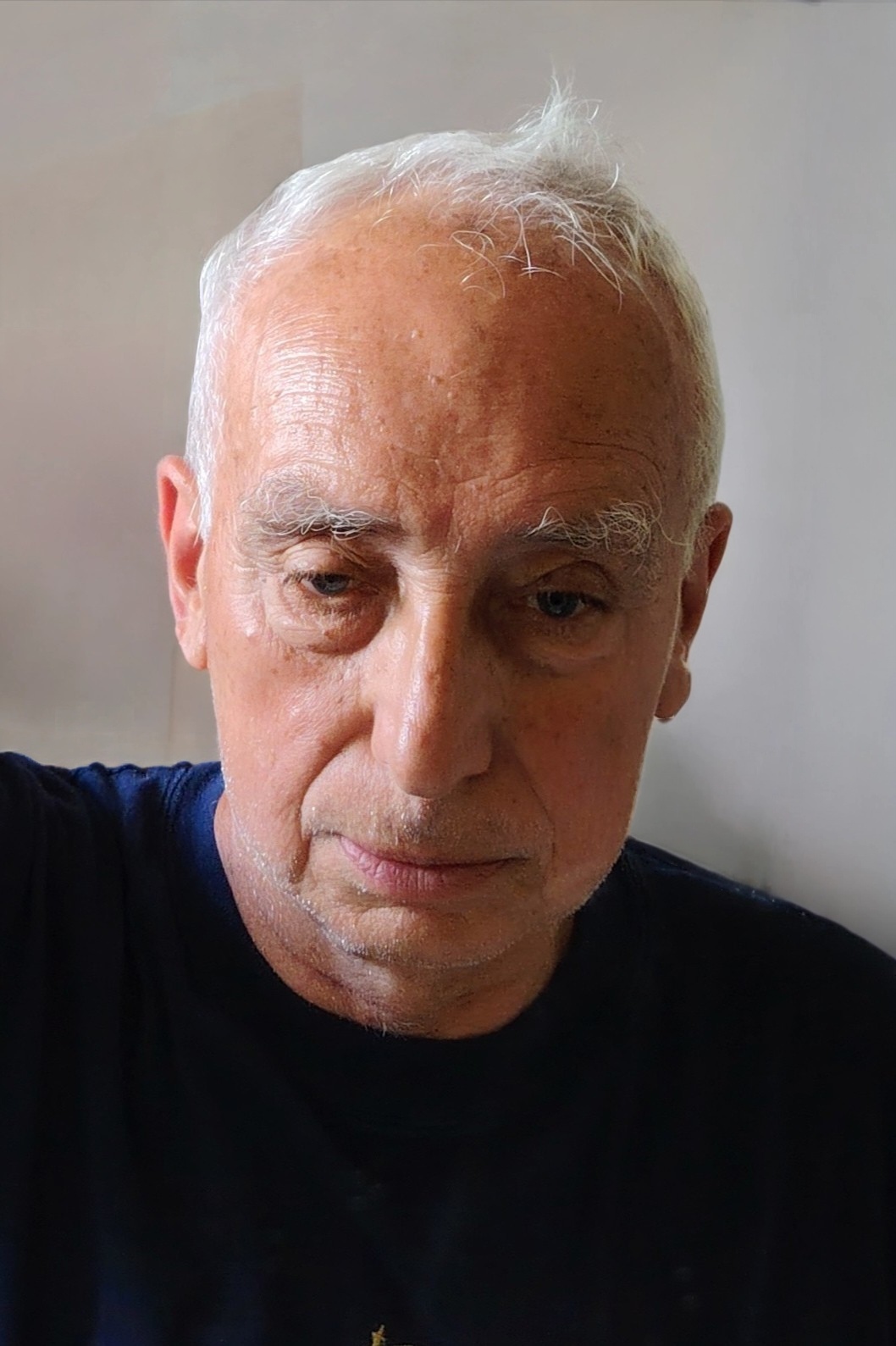 Tomislav Maretić
Tomislav MaretićTomislav Maretić (1951) is a MD (a specialist for infectious diseases) from Zagreb city, Croatia. He has been writing haiku for almost forty years and his haiku have received several awards and prizes. He lives in Gornje Vrapče, a picturesque village near the Croatian capital city with his wife and four children.
-
Matas, Duško
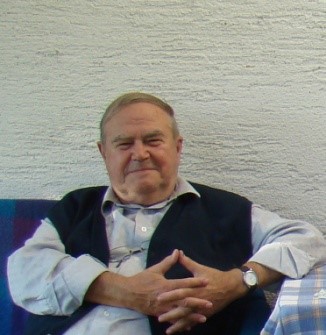 Duško Matas (1933 - 2021)
Duško Matas (1933 - 2021)Duško Matas was a forensic psychiatrist. Most of his lifetime he lived and created in Zagreb, Croatia. His haiku were published in a number of magazines, miscellanies and post-contest anthologies in Croatian, Slovenian, Japanese, French, German, Romanian, Italian and English since 1988. He took part at most gatherings and recitals of the Croatian haiku poets and the contests for haiku in Croatia and abroad. He was selected on to the judging committee for haiku a number of times, evaluating haiku and senryu in the Chakavian dialect and Croatian. His haiku were presented in several anthologies and he received a number of awards in Croatia and abroad. He was a publisher of several haiku books as well.
Awards and Other Honours:
Second Prize, International Kusamakura Haiku Competition (1998); Award, Yellow Moon Literary Competition (2000); Second Prize, Ito-En, International Haiku Contest (2000); Commended haiku, UNESCO Paris (2000); Third Prize, Haiku Calendar/Rokovnik, International Haiku Contest in English, Ludbreg (2006); Second Prize, Kloštar Ivanić Haiku Contest, English language Category (2006); Second Prize, Kloštar Ivanić Haiku Contest, Croatian language category (2004); Honourable Mention, Haiku Calendar/Rokovnik, Ludbreg (2003); Honorary Mention, The 36th A-Bomb Memorial Day Haiku Meeting Competition (Kyoto, 1999); The Ludbreg Column of Haiku Poets, a travelling recognition which has been awarded yearly at Ludbreg Haiku Meetings to Croatian Haijin since 2003. Two haiku were selected for inclusion in William J. Higginson's Haiku World: An International Poetry Almanac(Kodansha International, 1996); Honourable Mention, World Haiku Festival 2010 in Nagasaki, Competition on the theme of the Atomic Bomb (2010); Honourable Mention, Vancouver Cherry Blossom Festival (2010); work included on the Haiku Society of America's "Haiku Wall" at the Liberty Theatre Gallery in Bend, Oregon (June 3-5, 2011): Honorable Mention, The 18th Mainichi Haiku Contest 2014.
Books published - Japanese short poems:
Vodene trave(Water grasses), Zagreb 1991
Vrh planine / Mountain Top, Zagreb 1998
Ljubavna priča / Love Story, Zagreb 1999Collaborated haiku collections:
Sedam putova / Seven Ways, Zagreb 2000
Sedam novih putova / Seven New Ways, Zagreb 2003Collaborated haiga collection
Olovka i kist / Svinčnik in čopić/ Pencil and PaintbrushHaiku by seven authors illustrated by Rudi Stopar, Sevnica, Slovenia 2010
Selected haiku:
lane along the stream
following it down
and upstaza uz potok
slijed ga nizvodno
i uzvodno
(Second Prize, International “Kusamakura” Haiku Competition, Japan 1998)*
the weeds grow
on the demined land –
“A mine field”raste korov –
na izrovanoj zemlji
piše “minsko polje”(Honorable Mention, The 36th A-Bomb Memorial Day Haiku Meeting Competition, Kyoto, Japan 1999)
*
low flight of a bird
a swollen stream carrying
an empty nestniski let ptice
nabujali potok nosi
prazno gnijezdo(Second Prize, Ito-En International Haiku Contest, Japan 2000)
*
flamingo standing
in the low tide, a movement
a fish in the beaku oseki mora
stoji flamingo, kretnja
u kljunu riba(Award, Yellow MoonLiterary Competition, Australia, 2000; Antologija Haiku Europejskiego Gwiazda za Gwiazda, Krakow, Poland, 2005)
*
the sunset
thins out
the cicadas’ songzalazak sunca
istanjuje
pjesmu cikada(Greieri şi crizanteme, Haiku Antologie Internaţională, Editura Orion, Bucureşti 2007 Editor: Valentin Nicoliţov)
-
Oreč-Gavran, Zdenko
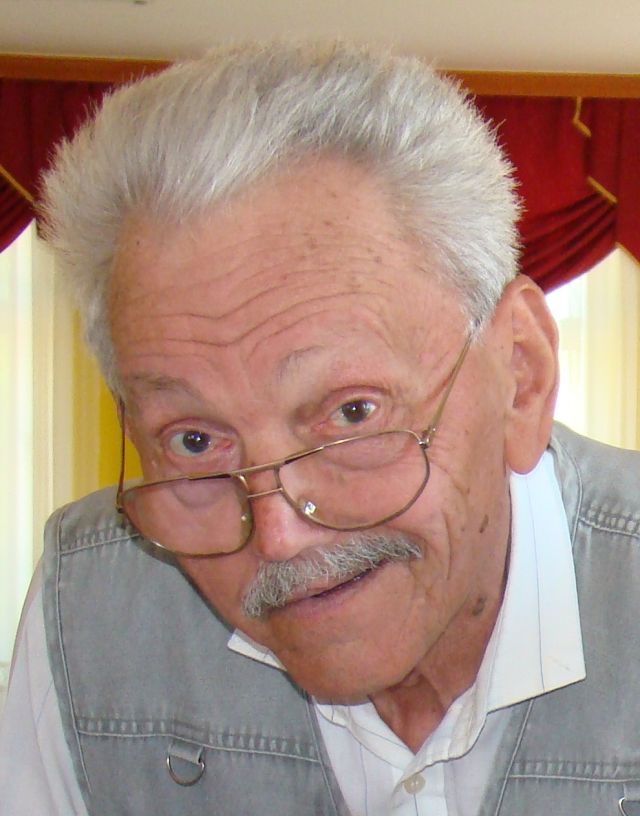 Zdenko Oreč-Gavran
Zdenko Oreč-Gavran(1930 ̶ 2021)
Zdenko Oreč-Gavran was born on 20 April 1930 in the town of Zvečevo, Croatia. He founded the Ludbreg Haiku Meetings (Ludbreški haiku susreti) in the town of Ludbreg, northeast of Zagreb. This gathering of haiku poets has been held every year since 1997 and is open to the public. The first Haiku zbornik - Ludbreg was published in 1998 and included materials from the 1997 gathering. Until 2003 miscellanies were published privately by Oreč-Gavran. The Miscellany was a major publication where poets were invited to contribute haiku to the annual publication, and the selected work was published in the Haiku Miscellany.
Oreč-Gavran was also co-editor of the annual Haiku Calendar/Rokovnik and edited and published annual miscellanies of children's haiku. He was a member of the judging commissions for haiku and senryu. In 2006 he was awarded the annual Ludbreg column of haiku poets, transitional chalice for haiku poets. Besides haiku he was publishing prose, poetry and riddles in a number of journals and newspapers. He issued two collections of aphorisms and a book of puns from children's textbooks. He wrote haiku and senryu in Croatian and the Kajkavian Dialect. Zdenko Oreč died in Ludbreg in 2021.
Awards and Other Honours:
- Zbornik Haiku Konkurs 'AN4-2001'/Anthology Haiku competition 'AN4-2001';
- Encouragement Award, Ito-En, International Haiku Contest (1997);
- Second Prize, International Kusamakura Haiku Competition (1998);
- Second Prize, International Kusamakura Haiku Competition (1999);
- Marijan Čekolj i Marinko Španović: Otvoren put /Free Road: Antologija hrvatske haiku poezije [Croatian Haiku anthology] (Hrvatsko haiku društvo: Samobor, 1999);
- 100 Croatian Haiku [An anthology for the Haiku Cards Game] (DHHP, Zagreb 2000);
- Very good haiku, A-Bomb Memorial Day Haiku Meeting (2001);
- Third Prize, International Kusamakura Haiku Competition (2003);
- Second Prize, Kloštar Ivanić Haiku Contest, Croatian language category (2004);
- Annual Ludbreg column of haiku poets award, Croatia, 2006;
- Second Prize, International Kusamakura Haiku Competition, Japan 2008;
- Commendation, Pumpkin Festival Haiku Contest (Ivanić-Grad, Croatia, 2015).
Haiku/Haiga Books Published:
- Rijeke šume (Rustling Rivers), Ludbreg, 1996;
- Školjka u pijesku (A Shell in the Sand), Ludbreg, 1998;
- Plodovi nesanice: 1991 (Fruits of Insomnia: 1991). Ludbreg, Croatia: published privately, 1999;
- Neprolazni susreti (Unpassable Encounters), Ludbreg, 1999;
- Olovka i kist (Pencil and Paintbrush), haigas painted by Rudi Stopar (Slovenia); haiku by Zdravko Kurnik, Zvonko Petrovic, Julija Ivic, Dusko Matas, Boris Nazansky, Zdenko Oreč, and Rudi Stopar; in Croatian, Slovenian, English and Japanese, Zagreb, 2010.
Selected works:
ona mu okrene leđa
na mjesečini
obrisi brda u porastushe turns her back
in the moonlight
the mountain contour expands(Encouragement Award, Ito-En, International Haiku Contest, Tokyo, Japan, 1997)
ljetni pljusak
pod stablo padaju cvjetovi
na suhosummer downpour
under the tree-crown the blossoms
falling into dry(Second Prize, International Kusamakura Haiku Competition, Japan, 2008)
dostavno vozilo
radi u snijegu ̶
miris kruhaa delivery van
working in the snow ̶
the smell of bread(Second Prize, the International Kusamakura Haiku Competition, Japan, 1999)
TV-sapunicama
ispiru sjećanja
na prljavi ratwith TV serials
they are rinsing our memories
of the dirty war(Awarded (very good haiku) at the 35th A-Bomb Memorial Day Haiku Meeting, Kyoto, Japan, 2001)
sjemenke suncokreta
padaju
u svoju sjenusunflower seeds
falling into
their own shadows(Otvoren put/Free Road, An Anthology of Croatian Haiku Poetry, Croatian Haiku Society, Samobor, 1999. (Edited by Marijan Čekolj and Marinko Španović)
zvonki udarac
grane o krov auta
ispraznio kafićresonant sound ̶
a bough on the car roof
emptied the pub(Haiku No. 21/22, The Assocication of Croatian Haiku Poets, Zagreb, 2004 (Edited by. D. V. Rožić)
priđoh prozoru
da pobrojim ptice
one odlijećuI come to the window
to count the birds
they fly away(Ludbreški haiku zbornik/Ludbreg Haiku Miscellany, Croatia, 2015)
ona miluje
svoj mobitel a dečki
čekaju rundushe is cuddling
her mobile phone ̶ the boys
ordered another round(Third Prize, „Afrodita“ erotic haiku/senryu contest, Ludbreg, Croatia, 2015 (Founded by Mirko Varga)
crna trepavica
na praznom papiru ̶
otvorena zagradaa black eyelash
on a blank paper ̶
an open bracket(IRIS No. 15, 2021, Ivanić-Grad, Croatia), Haiku translated by D. V. Rožić
Sources:
https://www.magicus.info/alternativci-i-korisnici/preporuci-knjigu-tehniku-alternativca/zdenko-orec
https://czkidn.hr/results-of-a-raven-haiku-contest-rezultati-haiku-natjecaja-na-temu-gavran/
http://dominikanac.blogspot.com/2020/11/u-spomen-36-zdenko-orec.html
https://haikupedia.org/article-haikupedia/haiku-in-croatia/
https://thehaikufoundation.org/poet-details/?IDclient=152IRIS International, Year 7th, No.7, 2021, Ivanić-Grad, Croatia
This profile was created in collaboration with Djurdja Vukelić-Rožić and Stjepan Rožić, who took the photograph. We appreciate their invaluable help in preparing Zdenko Oreč’s biography.
-
Pavlinović, Dejan
 Dejan Pavlinović
Dejan PavlinovićBorn 1968 in Pula, Yugoslavia
Living in Pula, CroatiaDejan Pavlinović is an English and German teacher, part-time tour guide and member of the indie band The Chweger. He has been writing haiku since 2007. He has published 3 haiku books: Mliječnom stazom/Down the Milky Way (2016), Nexus Haiku(co-authored, 2021), Linije života/Life Lines/生命線 (2024).
Blog:https://smilingcricket.blogspot.com
-
Primorac, Vera
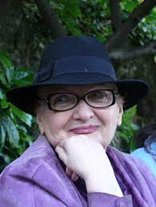 Vera Primorac (1942 ̶ 2022)
Vera Primorac (1942 ̶ 2022)Biography
Vera Primorac graduated from grammar school and the School for teachers in the town of her native town Mostar (Bosnia and Herzegovina) and graduated in the Croatian language and literature from the Pedagogical Academy. Most of her teaching years she worked at the Grammar School “Braća Šimić” in Mostar. She worked as a teacher in France as well, where she continued to write and paint on silk. She had a number of joint and independent exhibitions in France, Croatia, and Bosnia and Herzegovina.
Vera Primorac wrote poetry from her early childhood, publishing it in a number of literary journals, both in print and digital. For decades she published prose: aphorisms, columns, short stories, reviews and essays. She published ten books, her lyrics being translated into several languages. She edited twenty books of prose and poetry. For her haiku she received over twenty top international and domestic awards. Chosen by Krzysztof Kokot (Poland), she was on the list of the European Top 100 Haiku Authors in 2010 ̶ 2011. She was on the editorial staff of the Anthology of the Croatian Haiku Poetry, An Unmown Sky (1996 ̶ 2007). She was a member of several literary and haiku associations and as a member of Matrix Croatica, the Viškovo Branch, she was awarded the Plaque of the Municipal Viškovo, for her literary attainments and promotion of Croatia in 2009.
Awards and Other Honors:
Haiku sequence Award, Kloštar Ivanić Haiku Contest (2007); Award, A Little Haiku Contest by IRIS haiku magazine no 3/4, (Ivanić Grad, Croatia); Selected haiku (by Kōko Katō), Basho Festival Haiku Contest (2009); Two second prizes, The 13th International Kusamakura Haiku Competition (2008); Comendation, Apokalipsa haiku magazine contest (Slovenija, 2005); World Haiku 2010 No.6, World Haiku Association; Third Prize, International Kusamakura Haiku Competition (2006); First Prize, Kloštar Ivanić Haiku Contest, Croatia language category (2008); Second Prize for haiku sequence, Kloštar Ivanić Haiku Contest (2010); named one of the top 100 European haiku poets by haiku.forum.pl.; work included on the Haiku Society of America's "Haiku Wall" at the Liberty Theatre Gallery in Bend, Oregon (June 3-5, 2011); Honorable Mention, Vancouver Cherry Blossom Festival Award (2011)); Honorable Mention, Haiku Contest of the Journal of Romanian-Japanese cultural interferences HAIKU (2012).
Books published - Japanese short poems:
- Utočišta, Društvo haiku pjesnika Rijeka, 2006;
- Tragovi, Društvo haiku pjesnika Rijeka, 2007;
- Miris zemlje.Matica hrvatska ogranak Viškovo, Viškovo, 2008;
- Dvije obale/dva kraja, hrvatski jezik i čakavsko narječje, Viškovo, 2013.
Selection of haiku:
spring adorned
by crimson sour-cherries
behind both earsrumenom višnjom
proljeće se okiti
iza oba uha(Third Prize, International “Kusamakura” Haiku Competition, Japan 2006)
*
from an old photo album
smiling at me tenderly
childhoodiz starog fotoalbuma
nježno mi se smiješi
sjetinjstvo(Two Second Prizes, The 13th International “Kusamakura” Haiku Competition, Japan 2008)
*
with drops
of rain
a rain of petalss kapljicama
kiše
kiša latica(Special Merit Award, The 20th Itoen “Oh-I-Ocha” New Haiku Contest, Japan 2012)
*
a ruined house
knitted all around
in the cobwebsrazrušena kuća
premrežena unaokolo
paučinom(Commended work, The 42nd A-Bomb Memorial Day Haiku Contest, Japan 2008)
*
autumn evening
rain poured music
into the guttersjesenja večer,
kiša ulila glazbu
u oluke(Ploc la revie du haiku No. 31, France 2012)
Sources:
https://thehaikufoundation.org/poet-details/?IDclient=138
https://akitahaiku.com/2011/11/12/3-11-haiku-from-vera-primorac-croatia/
http://www.worldhaiku.net/poetry/si/vera_primorac/1st.html -
Škrgulja, Vida Pust
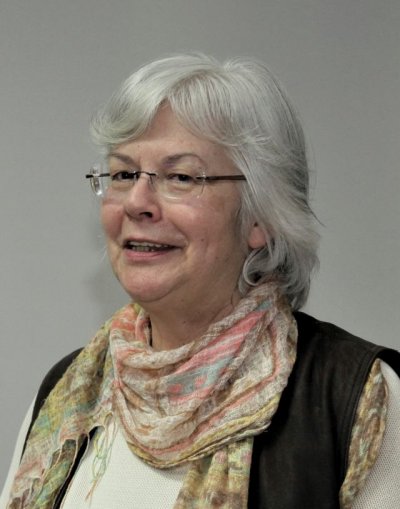 Vida Pust Škrgulja
Vida Pust Škrgulja(1952 - 2021)
Vida Pust Škrgulja was born in Ljubljana, Slovenia in 1952. She graduated in Latin and History of Art from the Department of Philosophy at University of Zagreb, and spent her working years as a teacher of Latin and Arts in high schools in the towns of Ivanić-Grad and Križ, Croatia. Beside her teaching career and family, being a mother of four daughters, she spent her time on a number of activities, promoting arts and culture. By founding the association Amici hereditatis (Prijatelji baštine; Friends of heritage) in Ivanić-Grad, she started the process of founding the first museum in this town and was its first director. Through the decades she set up a number of exhibitions for local artists.
Škrgulja started writing haiku in the 1970s and was among the first haijin in Ivanić-Grad.
In 2003 together with Djurdja Vukelić Rožić and Stepan Rožić they inaugurated the Kloštar Ivanić Haiku Meetings (Kloštar Ivanić haiku susreti) and later in 2006 also founded the Haiku Association “Three Rivers” in Ivanić-Grad. Vida Pust Škrgulja was on the editorial board of the magazine IRIS and a judge for haiku and haiga contests. She wrote haiku in Croatian, Slovenian, Latin and English, and her work was featured in numerous miscellanies, anthologies and journals in Croatia, Slovenia, United Kingdom, USA and Japan. She has won several national and international awards as well. Vida Pust Škrgulja was bestowed Lifetime Achievement Award by the town of Ivanić-Grad in 2007. She died in Ivanić-Grad, Croatia in 2021.
Book published:
Sedam prozora / Seven Windows by Vida Pust-Škrgulja, Ljerka Poštek-Jelača, Djurdja-Vukelić Rožić, Marica Behtan-Cecelja, Franko Bušić, Stjepan Rožić and Robert Stipić. Ed. by Djurdja Vukelić Rožić, Kloštar Ivanić, Croatia: Agapa, 2002.
Some awards and honours:
- Encouragement Award, Ito-En, International Haiku Contest, Tokyo, Japan, 1997;
- Third Prize, The International Kusamakura Haiku Competition, Japan, 2000;
- Award (third choice), WHC R. H. Blyth Award, 2002;
- Lifetime Achievement Award by the town of Ivanić-Grad, 2007.
Selected works:
snježno jutro
u košari na polici
proklijao češnjaksnowy morning
in the basket on the shell
the garlic has sprouted(Encouragement Award, Ito-En, International Haiku Contest, Tokyo, Japan, 1997)
lastavice lete
nad ljetnom kućicom
uhvaćenom u čaši vinaswallows fly
above the summer house
caught in a glass of wine(Third Prize, The International Kusamakura Haiku Competition, Japan, 2000)
obasjano suncem
na plavome dnu ̶ stablo
uz jato ribalighted by the sun
on the blue bottom ̶ a tree trunk
among fish(Letni časi haiku magazine No. 16, Ljubljana, Slovenia, 2002)
jutarnji vlak
snježnim se ljestvama penje
sve brže i bržemorning train
climbing the snowy ladder
faster and faster(Award (third choice), WHC R. H. Blyth Award, 2002)
dječji se smijeh
uvukao
u gitaru na ziduthe children's laugh
crept into
the guitar on the wall(Sedam prozora/Seven Windows, joint haiku collection, Ivanić-Grad, Croatia, 2002)
na dnu škrinje
svežanj pisama i
svilena vrpcaat the bottom of the chest
a bundle of letters and
a silk ribbon(Blithe Spirit Vol 14 No 3, September 2004)
na dnu srebrne čaše
u staretinarnici
tragovi crnog vinaat the bottom of a silver cup
in an antique shop
stains of red wine(World Haiku 2006 No 2, WHA Japan)
noć bez zvijezda
u jednom prozoru
treperi svjetlostarless night
in one of the windows
flickering candle-light(Shamrock, Issue 6, Focus on Croatia, 2009)
umor večeri
rasplinu se pogledom...
zvjezdano neboevening fatigue
scattered in the gaze...
a starry sky(To the memory of Vladimir Devidé, the Kloštar Ivanić Joint Haiku Collection, Croatia, 2011)
stara singerica
u ladici unuk sakrio
svoje blagoin the drawer of
an old sewing machine
my grandson's treasure(Igračke/Toys, post contest anthology, the Haiku Association „Three Rivers“, Ivanić-Grad, Croatia, 2017)
starac, drščući
u vrećama otpada
traži darovea trembling old man
in search of Christmas gifts
through the bags with waste(IRIS No. 11, the Haiku Association „Three Rivers, Ivanić-Grad, Croatia 2017)
Haiku translated by the author.
Sources:
- Anthologies Nepokošeno nebo/An Unmown Sky 1 and 2, Croatia, 2011 and 2018
- IRIS International, Year 7th, No.7, 2021, Ivanić-Grad, Croatia
https://www.centarkulture.com/vida-pust-skrgulja/
http://www.worldhaiku.net/poetry/si/v.pust.skrglja/v.pust.skrglja.htm
https://www.youtube.com/watch?v=7EE3cAFpXfs
https://www.youtube.com/watch?v=qy3yUjkGncM
https://hrcak.srce.hr/file/381501
https://haikupedia.org/article-haikupedia/haiku-in-croatia/
https://tri-rijeke-haiku.hr/?cat=8&lang=en
This profile was created in collaboration with Djurdja Vukelić-Rožić and Zdenko Vanjek, who took the photograph. We appreciate their invaluable help in preparing Vida Pust Škrgulja’s biography.
-
Španović, Marinko
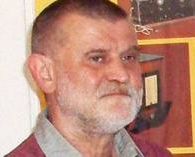 Marinko Španović
Marinko Španović(1955-2011)
Marinko Španović was born in Samobor, Croatia in 1955. He has been writing within the literary group ‘Katarza’ in Samobor since 1975. His haiku have been published in many haiku journals and magazines, such as South-West, Daily Yomiuri, Mainichi Daily News, Feasta, Woodpecker, and others. Marinko edited over 30 haiku collections and anthologies, and wrote a number of book reviews. He was a selector and a translator to and from English, presented in many anthologies. Marinko has published six books: two books of poetry and four bilingual haiku collections. He was also an editor at Sparrow (Vrabac) – the magazine of the Croatian Haiku Association. Marinko was not only one of the most presented Croatian haiku poets but he also won numerous awards and honours both national and international.
Marinko Španović died unexpectedly in Samobor on 8 July 2011.
Awards and Other Honours:
- Third Place, 300th Anniversary of Basho's 'Oku No Hosomichi' and Days of Japanese Culture and 'NHK' Japanese TV (1988);
- Mainichi Haiku Contest (1998);
- Toranomon Haiku Newsletter by Sakuzo Takada (1999), 101 Haiku (edited by Sakuzo Takada and Fusao Maki); Favourite Haiku, Tom Noyes, Azami Yutaka Ikokku Santo (1998);
- Commendation by Polish Haiku Society for haiku cyclus Slavonske šume/Forests of Slavonia and for long time collaboration (2000);
- Choice of haiku, The Herb Barrett Award (Hamilton, Canada, 2000);
- Mainichi Daily News Haiku Column (June 2001);
- Commendation, Haiku Calendar/Rokovnik, Ludbreg, Internationl Haiku contest in English (2001);
- Honourable Mention, HIA 4th haiku contest (2002);
- Award, Ito-En, International Haiku Contest (2003);
- First Prize, Haiku Day, Dubravko Ivančan (Krapina, 2003);
- Third Prize, Kloštar Ivanić Haiku Contest, Croatian language category (2003);
- Commendation, The 39th A-Bomb Memorial Day (2005), Third Prize, International Kusamakura Haiku Competition (Kumamoto, Japan, 2005);
- 22nd Prize, Kloštar Ivanić Haiku Contest, Croatian language category (2005);
- Honourable Mention, Mainichi Haiku Contest (2005);
- First Prize, Haiku Day, Dubravko Ivančan (Krapina, 2006);
- Genkissu! Spirits Up! World Wide Hekinan Haiku Contest Award in Japan (2007);
- Second Prize - Kloštar Ivanić Haiku Contest, Croatian language category (2010).
Books and some other publications:
- Planinski vjetar / Mountain Wind, Edition Matsuo Basho, Haiku poetry, Razvigor, Požega (Ex-Yugoslavia, 1988);
- Duga / The Rainbow, Haiku poetry, Edition Matsuo Basho, Dom kulture Odžaci (Ex-Yugoslavia, 1989);
- Poljubac svjetlosti / Kiss of Light (Hrvatsko haiku društvo: Samobor, 1995);
- Brbljanje o neizrecivom / Gassing about the Unspeakable (Hrvatsko haiku društvo: Samobor, 1998);
- Otvoren put/Free Road, Anthology, editors: Marijan Cekolj, Marinko Spanovic, Samobor 1999);
- haiku selected for inclusion in William J. Higginson's Haiku World, An International Poetry Almanac (Kodansha International, 1996);
- 10 haiku selected for inclusion in A. Duhaime's Canadian Anthology, Haiku Without Borders (1998); haiku selected for inclusion in Knots: The Anthology of Southeastern European Haiku Poetry [edited by Dimitar Anakiev and Jim Kacian] (Prijatelj, Slovenia, 1999; distributed by Red Moon Press).
Selected work:
dječji crtež
iste su boje tenk
vojnik i suncea child's drawing:
the same color for tank,
for soldier, and sun(Haiku in Wartime (Croatian Haiku Association, 1992); also in Frogpond 22:2 (1999)
*
nastupa zima;
očevim češljem gladim
svoju kosuwinter setting in;
with my dad's comb
I stroke my hair(Third Prize, International Kusamakura Haiku Competition (2005)
*
proljetna kiša
poskakuje poklopac
zakipjelog grahaspring rain—
the lid is hopping
over boiling beans(Third Place, 300th Anniversary of Basho's 'Oku No Hosomichi' and Days of Japanese Culture and 'NHK' Japanese TV (1988)
*
pružajući ruku
kojom prosi, skriva drugu
koje nemaextending a hand
the beggar hides the other
he hasn't got(William J. Higginson: Haiku World, An International Poetry Almanac (Kodansha International, 1996)
*
ledeni siječanj
kosti drveća škrguću
u zubima suncaiced January
trees’ bones gnashing
in the sun’s teeth( 7. haiku dan/7th Haiku Day - Dubravko Ivančan, Krapina 2006 - 1. nagrada/1st Prize)
*
božićno jutro:
tri ljeta od očeve smrti
miriše škijaChristmas morning;
three years from my dad’s death
the smell of his tobacco...(Haiku Calendar/Rokovnik, Ludbreg 2001, Internationl Haiku contest in English – Commendation)
*
munja terasom
a potom grmljavina
napuni prazne čašelightning on the terrace
afterwards the thunder fills
... our empty glasses...(Mainichi Daily News Haiku Column, June 2001)
*
slijepčev štap
osluškuje vodu
u lokvicia blind man’s stick
listening to water
in the puddle(Ito-En, International Haiku Contest, Tokyo, Japan, 2003 - 5th Place Award)
*
Isa Isa oh,
kako je teško
voljeti muheIssa Issa
it’s so hard to love
the flies(101 Haiku edited by Sakuzo Takada and Fusao Maki, Toranomon Haiku, Newsletter by Sakuzo Takada, 1999)
*
zimsko jutro
sestra je osmijehom
proširila nebo- Winter morning
my sister widens the sky
with her laughter(Woodpecker, magazine for sharing haiku, Leeuwarden, Netherlands, No. 2/2002)
Sources:
- http://www.magicus.info/hr/magicus/tekst.php?id=72406
- http://www.samoborskiglasnik.net/zivot.asp?datum=20110711
- http://www.thehaikufoundation.org/poet-details/?IDclient=148
- https://www.scribd.com/doc/95422941/Antologija-hrvatskoga-haiku-pjesni%C5%A1tva
- http://www.radiosamobor.hr/2012/07/09/marinko-spanovic-pjesnik-kojeg-motika-vise-nije-htjela/
- http://www.tempslibres.org/aozora/mag/jhome.html
- http://www.croatianhistory.net/etf/haiku.html
-
Stamenković, Mile
Mile Stamenković
(1952-2000)
Mile Stamenković was born in 1952 in Ogulin, Croatia. He was a medical doctor, gynaecologist and had a Master’s Degree in Medical Sciences. He died in Rijeka in 2000. Mile was also a prominent writer and haiku poet and his poems and haiku have been published in magazines and anthologies in Croatia and abroad. He was a member of The Croatian Haiku Association and The Haiku Society of America.
Mile Stamenković started writing poetry more intensely from 1974 onward and won his first prize in 1977 in the ‘Goranovo proljeće 77’ poetry competition. From then on his poems appeared in many national and international magazines. His haiku were featured in some of the most prestigious haiku journals, anthologies and haiku-calendars (Blithe Spirit, Azami, Woodpecker, Modern Haiku, Haiku Headlines, Hobo, Paper Wasp, The Daily Yomiuri, KŌ, Frogpond, Timepieces). His haiku was also included in Haiku World, an International Poetry Almanac by W. J. Higginson, 1996.
Mile published and illustrated two books of poetry in 1976 and 1993, and a collection of haiku, Breaths of July's Linden Forests, waka and renga in 1995. In 1998 he co-edited with Jadran Zalokar a trilingual anthology of haiku poetry (in Croatian, Italian and English) - Hvatanje sjenke vjetra/ Catturare l'ombra del vento/ Grassping the Shadow of the Wind. In the same year in Rijeka, Mile Stamenković hosted the first meeting of haiku poets from that region.
Books published:
- Poezija i ilustracije, (Poetry and illustrations), 1976;
- Poezija i ilustracije, (Poetry and illustrations), 1993;
- Dahovi srpanjskih lipika / Breaths of July's Linden Forests, waka and renga, 1995;
- Hvatanje sjenke vjetra / Catturare l’ombra del vento / Grasping the Shadow of the Wind, regionalna antologija haikua / Regional Haiku Collection, Rijeka 1999.
Selected haiku:
Uništen prostor - Destroyed area -
vjetar se zaustavio the wind has stopped
pod divljim kestenom. under the horse-chestnut.(An Award, 33rd A-Bomb Memorial Day Haiku Meeting Competition, Kyoto, 1999)
*
Vjetar u šašu. Wind in the reed.
Divlje guske gledaju The wild geese look
u vodu... into the water...(Vrabac/Sparrow No. 7-10, 1994-1995)
*
Next to the flutter
of the wings, the buildings
had flown through.(In the Prime Selection for the best Croatian haiku of the year - Second Annual Haiku Competition 1994 of the Croatian Haiku Association)
*
to be waist deep
in water: neither man
nor – fish.(Haiku World, An International Poetry Almanac William J. Higginson; Kodansha International Tokyo-New York-London, 1996, p. 125)
*
A demolished town.
The wind howls not knowing
where it would go.(Calendar-book the Timepieces: Haiku Week-At-A-Glance 1997)
*
an owl hooting…
the moon slowly siling
down the windy night(Hvatanje sjenke vjetra/Catturare l'ombra del vento/Grasping the Shadow of the Wind, Regional Haiku Anthology. StaM, Rijeka 1999)
*
In the deserted town
hungry war victims
feed the pigeons.(Knots: The Anthology of Southeastern Europe Haiku Poetry.ed. by Dimitar Anakiev, Jim Kacian, Tolmin, Slovenia: Prijatelj Haiku Press, 1999)
*
A distant offing.
Shimmering under the Sun
some fish and shells.Daleka pučina.
Na suncu se ljeskaju
ribe i školjke.(Karolina Riječka 2004 - 2005)
*
The morning guest
shaking down the snow
of his worn out coat.Jutarnji gost
otresa snijeg sa svog
istrošenog kaputa.(Nepokošeno nebo/An Unmown Sky (Antologija hrvatskoga haiku-pjesništva 1996-2007/Anthology of Croatian Haiku Poetry 1996-2007), ed. by Đurđa Vukelić-Rožić, Ivanić Grad, 2011)
Sources:- http://www.thehaikufoundation.org/omeka/files/original/8ee21d6108c6ac9016504459540b570f.pdf
- http://www.worldhaiku.net/poetry/si/m.stamenkovic/stamenkovic.htm
- http://library.foi.hr/M3/kautor.asp?B=1&css=&dlib=1&O=1&A=0000013658&Upit=STAMENKOVI%C6,%20Mile
- http://www.gendaihaiku.com/kacian/beyondkigo.html
- http://www.karolina-rijecka.com/haiku.html
- http://www.magicus.info/hr/magicus/tekst.php?id=72391
- http://simplyhaikujournal.com/past-issues/simply-haiku-2011/autumnwinter-2011/reviews/an-unmown-sky.html
- http://www.tempslibres.org/aozora/en/memo/memo05.html
This profile was created in collaboration with the Croatian poet and editor Đurđa Vukelić-Rožić. We are very grateful for her support and dedication!
-
Tomić, Luka
LUKA TOMIĆ (1933 ̶ 2022)
 Biography
BiographyLuka Tomić, a writer and politician, lived and worked in Makarska, Croatia. He had a PhD in Economics and was the first president of the Matrix Croatica, Makarska branch. His work was translated into Slovenian, Romanian, Macedonian and English. Professionally, he published about eighty scientific papers in the fields of bookkeeping, organization, work evaluation and planning. During his lifetime he performed various business functions in different companies and was an expert lecturer for future economists. He was the President of the Assembly of the Split-Dalmatia County. He was awarded the Order of Ante Starčević by Croatia’s first president Franjo Tuđman in 1997. Luka Tomić published 15 collections of aphorisms and epigrams, and a collection of poetry.
Books published – Japanese short poems:
- Smokvin list (A Fig’s Leaf), Makarska, Croatia, 2014;
- Iskroskok / Sparkling of the Sparks, Makarska, Croatia, 2018.
Selected haiku and senryu:
even a kerosene lamp
may diminish the light
of the skyi petrolejka
može smanjiti svjetlost
nebeskog svoda(Smokvin list, 2014)
*
spring mist
the sailboat masts
hung in the airproljetna izmaglica
jarboli jedrenjaka
vise u zraku(The 9th Yamadera Basho Memorial Museum, Japan, 2017)
*
a house dog knows
he is allowed to bark
only within himselfkućni pas već zna
da jedino u sebi
smije lajati(First Prize, The Ivanić-Grad Senryu Contest, Croatia, 2017)
*
the seagulls call
from invisible heights
louder than the stormzov galeba
iz nevidljivih visina
glasniji od nevere(EarthRise Rolling Haiku Collaboration, THF, USA, 2017)
*
the Bora of Primorje*
gust after gust
in y rhythm without rhythmprimorska bura
raful za refulom
u ritmu bez ritma(IRIS No. 11, Croatia, 2017)
*Primorje – the Croatia Littoral
-
Vukelić-Rožić, Djurdja
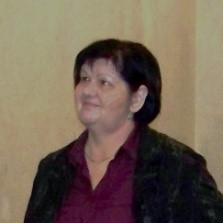 Djurdja Vukelić-Rožić
Djurdja Vukelić-RožićBorn (1956) born/lives in Croatia.
The principal editor of IRIS International webzine. (ISSN 1849-8639)). She publishes short stories, poetry and haiku in Croatian, Kajkavian and English. She edited and translated a number of collections and anthologies including An Unmown Sky (2011) and An Unmown Sky 2 (2018).
e-mail:This email address is being protected from spambots. You need JavaScript enabled to view it.
-
Vurdelja, Milka
MILKA VURDELJA (1935 ̶ 2022)
 Biography
BiographyMilka Vurdelja (neé Serdar) wrote poetry and she had her haiku, senryu, tanka and haibun published in domestic journals and joint collections. She spent her working years as a teacher of the Croatian language and literature. For over thirty years she was the head of the school’s literary section “Club of the Friends of Books“ for which she organized a number of meetings of the pupils with writers. Milka Vudelja was a member of the Editorial Board of the joint collection Koraci k suncu (Steps towards the Sun), published by the Folk Society of Grammar School “Vlado Knežević“. For her dedicated work and zeal, she was honoured with the Order of Labour with Silver Wreath in 1977.
Selected haiku:
dancing the reel
with Barbie dolls
my granny’s ragdollu kolu barbike
i lutka moje bake
od krpica(Toys, a post-contest anthology, Croatia 2017)
*
my yard
warmed up by the flowering
dandelionsmoje dvorište
toplo od rascvjetalih
maslačaka(Ludbreg haiku miscellany, Croatia, 2018)
*
an outline of a combine
in a cloud of cuttings
and grasshoppersobris kombajna
u oblaku od pljeve
i skakavaca(IRIS No. 12, Croatia, 2018)
Selected tanka:
the morning sun
glistening on the roofs
after drizzle
the scent of wet clothing
fill the classroomjutarnje sunce
blista na krovovima
poslije pljuska
miris mokre odjeće
puni učionicu(IRIS No. 12, Croatia, 2018)
*
Calm evening
a wet smoke twisting
above potato field
the scent of autumn
in my brother’s hairProhladna večer
krumpirištem se vije
ovlaženi dim
miriše jesen u kosi
moga umornog brata(IRIS No. 13, Croatia, 2019)
